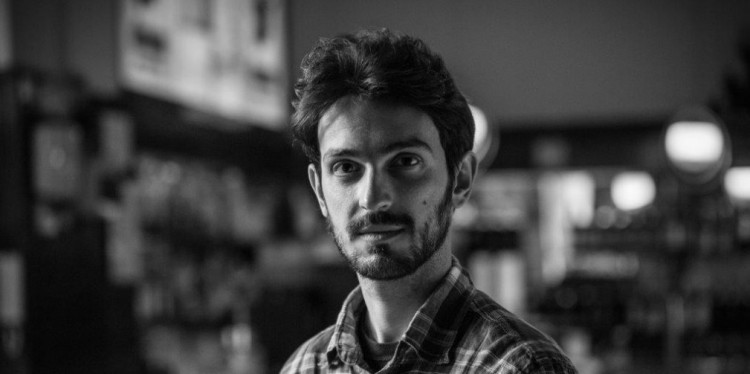Your story in ten 10 lines
I was born in 1981, raised in Caronno Pertusella – an industrial town in the province of Varese close to Milan – and I began to write when I was about sixteen, seventeen years old. I threw away the first four novels. The fifth, in 2007, was my debut. In the meantime I lived a year in France and graduated with a degree in philosophy; after I published some other books, changed a few jobs, lived several months in Ireland, etcetera. I’m now thirty-three, I live in Milan and I publish for Sellerio.
Which literary magazine do you read besides the one you created and publish?
Lo Straniero, Inutile, and the New Yorker. Actually more than anything I read magazines with a social commitment.
Eleanore Rigby was a literary magazine, which published fiction and non-fiction, rather irreverent and a bit punk-like in style (although it was packaged in a libertarian way, quite stylish). I did it with another four friends, and it really was a great period: meetings – flowing of beers and cigarettes, loads of stories to read and choose from… I use the past tense because the last issue officially came out years ago, but “Eleanore” is not gone forever and buried because of that. Let’s say that it is in a frozen stage from which it could rise from at any moment.
“Morte di un uomo felice” (Sellerio, Palermo) is the clever deviation from both biography and storytelling and it is aimed at creating a magic moment in which one can found is citizen nature; I dare to say: an inspiration for nation. In a very musical sense, it could be a composition for gas-tight rooms inhabited by recent history (often only in our country) where music is able to run through traversing them all. Have you ever thought about your wonderful and touching novel, when writing it, as a book which could educate Italian students? Why, if I may, did you dedicate it to your mother?
I’ll start from the end: the dedication is for my mother simply because it was owed to her. In all these years she has always been the counterbalance with her good mood to my natural pessimism and anxieties.
In regards to the first question: no, when I write I only think about writing – on the contrary any temptation to “educate” my reader, may it be a student or an adult, is by far a long way away from my idea of writing. I was thinking and always think only about the story, the characters, about the realities I write about. That’s all.
What sort of encounters do you have when you’re working? Other writers, interviewed by this magazine, talk to us about the loneliness of the writer. Do you share this too, given the important research for your books?
It depends. “Babele 56” was written listening to many people and tells the story (actually, of nine – maybe of several more) of eight of them. This book on the other hand almost totally grew out of my complete solitude. I’m absolutely convinced that a writer must at first learn the art of being alone and away. Then there are naturally research phases that imply contact with others – interviews, discussions and so forth. But 99% of the work is in a room without anyone around.
What does society do for you?
It offers me a place to stay and and the same time it defines my areas of conflict with it.
What do you do for your society?
I try, as a human being, to make it a little better – the little bit I can – practicing intellectual honesty, kindness and the wish to fight the inequality which is at its heart.
As a writer, I tell stories.
Something remarkable that happened to you recently, besides having won the Campiello 2014 with ‘Morte di un uomo felice’ (Death of a happy man)?
The love that resulted around this victory from friends, colleagues, readers and acquaintances. The fact that I have not won alone.
A culinary passion?
My favorite dish is spaghetti with sauce. Easy-peasy.
Which wine/drink?
No doubt, beer. But I don’t dislike red wine too, preferably from Umbria or Friuli.
The music or a book (not yours) that accompany you.
As I’m writing these lines I have “Rebel Cities” by David Harvey and I’m listening to At the Drive In. But these are not really representative choices: I have very varied tastes in both cases.
Can you anticipate something about the writings which are on your desktop area at the moment – or the notebook if you still use it?
I have a couple of ideas, but it’s still early to be dealing with them. At the moment I’m quite busy between work and meetings; as soon as I will be in a calmer period I will think about them. The only thing I can say is that the diptych on justice ends here: The next book will have nothing to do with judges and surroundings.
A talent you have and one you’re missing?
One I have: being able to write (or at least I hope). What I totally lack? Many things: amongst the most important the capacity to sing and draw.
What are your methods for living a “slow” life?
I don’t own a smartphone; I always try guarantee to myself the option to be on my own for a while; I use a bicycle and public transport. And the important things always stay the same – my loved ones, freedom, writing and reading: all elements that are appreciated only living “slow”.
What have you learnt from life until now?
Not to answer this sort of question.
Translation by Paolo Witte
